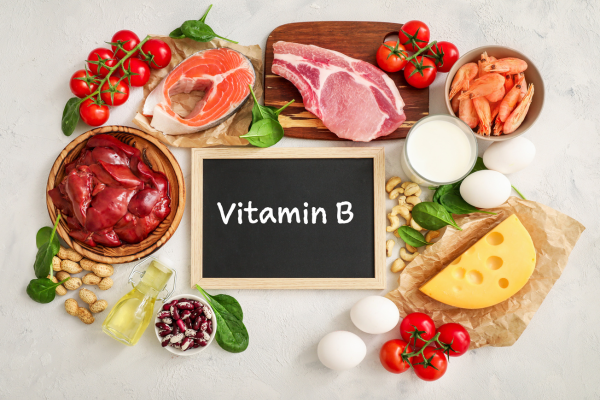Are you slowly losing your mind and energy without even knowing it?
As we age, a frightening truth lurks behind the facade of normal aging:
Many older adults are unwittingly sabotaging their own energy levels and brain function.
Imagine feeling a fraction of your younger self’s energy, your mind clouded and forgetful, while the secret to rejuvenating both lies within your reach.
The culprit? A deficiency in essential B vitamins.
In this article, we’ll unravel the critical role that B vitamins play in combating fatigue and mental decline.
From boosting your energy levels to enhancing cognitive health, these vitamins are the unsung heroes in the battle against aging.
We’ll delve into the benefits of specific B vitamins and reveal how incorporating them into your diet can help you regain the vitality and mental sharpness you thought you’d lost forever.

Understanding B Vitamins
B vitamins are a group of water-soluble vitamins essential for various metabolic processes in the body.
B vitamins collectively support energy production, red blood cell formation, brain function, and DNA synthesis.
They help convert food into energy, maintain healthy skin and muscles, enhance immune and nervous system functions, and reduce the risk of heart disease and birth defects.
These vitamins are vital for maintaining overall health, particularly as we age.
The Role of B Vitamins in Energy Production
These B vitamins collectively ensure that our bodies efficiently convert food into energy, supporting overall vitality and health, particularly as we age.
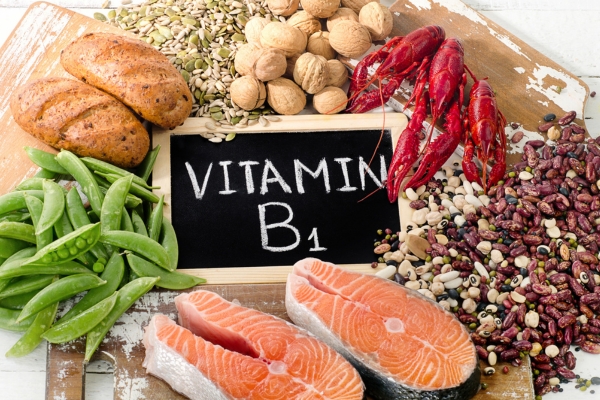
B1 (Thiamine)
B1, also known as thiamine, is essential for energy metabolism.
It plays a crucial role in converting carbohydrates into energy, which is necessary for the proper functioning of the muscles, nerves, and heart.
Thiamine also helps in the production of adenosine triphosphate (ATP), the molecule that carries energy within cells.
Thiamine can be found in a variety of foods such as whole grains, pork, fish, and legumes.
The recommended daily intake is 1.2 mg for men and 1.1 mg for women. [1]
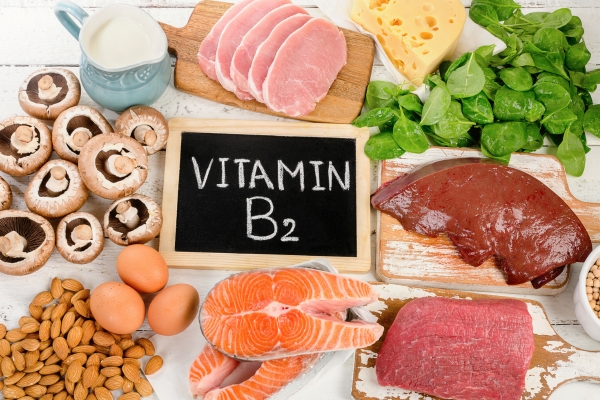
B2 (Riboflavin)
B2, or riboflavin, is vital for converting food into energy.
It supports cellular function by helping to break down proteins, fats, and carbohydrates.
Riboflavin is also important for maintaining healthy skin and eyes and for the production of red blood cells.
You can find riboflavin in eggs, dairy products, green vegetables, and meat.
The recommended daily intake is 1.3 mg for men and 1.1 mg for women. [2]

B3 (Niacin)
B3, known as niacin, significantly impacts metabolism and energy release.
It helps convert nutrients into energy, supports the digestive system, skin health, and nerve function.
Niacin is also involved in the production of various hormones in the adrenal glands and helps improve circulation.
Niacin-rich foods include meat, fish, poultry, and whole grains.
The recommended daily intake is 16 mg for men and 14 mg for women. [3]

B5 (Pantothenic Acid)
B5, or pantothenic acid, is essential for energy production and the synthesis of coenzyme A, a molecule involved in numerous biochemical reactions in the body, including the synthesis and oxidation of fatty acids.
This vitamin is crucial for the formation of red blood cells and maintaining a healthy digestive tract.
Pantothenic acid can be found in chicken, beef, potatoes, oats, and tomatoes.
The adequate intake for adults is 5 mg per day. [4]
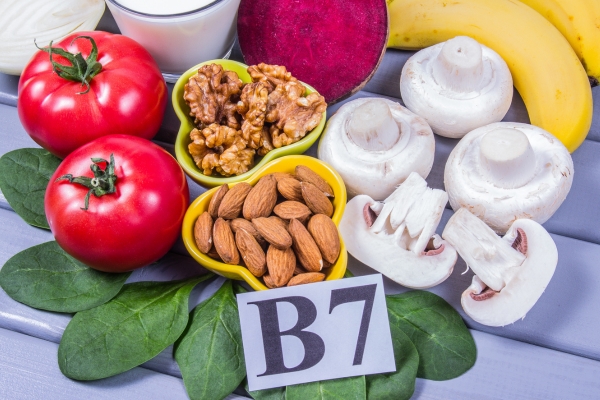
B7 (Biotin)
B7, commonly known as biotin, is important for various metabolic processes, including the metabolism of fats, carbohydrates, and proteins.
It supports the health of the skin, nerves, digestive tract, and cells.
Biotin also plays a role in maintaining healthy hair and nails.
Rich sources of biotin include eggs, almonds, spinach, and sweet potatoes.
The recommended daily intake for adults is 30 mcg. [5]
The Role of B Vitamins in Brain Function
These B vitamins are integral to maintaining cognitive health, supporting neurotransmitter function, and protecting against cognitive decline as we age.
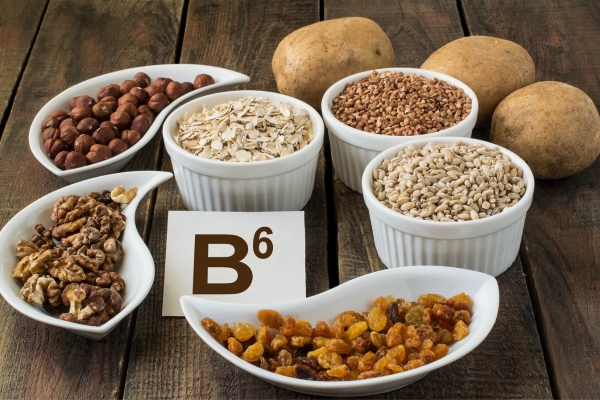
B6 (Pyridoxine)
B6, or pyridoxine, plays a pivotal role in neurotransmitter synthesis and cognitive development.
It is essential for the production of serotonin, dopamine, and gamma-aminobutyric acid (GABA), neurotransmitters that regulate mood, sleep, and anxiety.
B6 also contributes to the formation of myelin, the protective sheath around nerves, which is crucial for efficient signal transmission in the brain.
Foods rich in B6 include poultry, fish, potatoes, chickpeas, and bananas.
The recommended daily intake is 1.3 mg for adults under 50, and 1.7 mg for men and 1.5 mg for women over 50. [6]
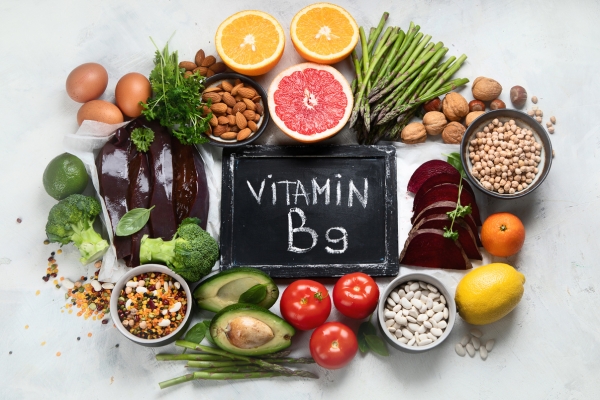
B9 (Folate)
B9, known as folate or folic acid in its synthetic form, is vital for brain health and preventing cognitive decline.
It supports the production of DNA and RNA, the body’s genetic material, and is particularly important during periods of rapid growth such as pregnancy and infancy.
Folate also aids in the formation of neurotransmitters and helps reduce homocysteine levels, an amino acid linked to an increased risk of cognitive decline and Alzheimer’s disease.
Key food sources of folate include leafy green vegetables, legumes, nuts, and fortified cereals.
The recommended daily intake is 400 mcg for adults. [7]
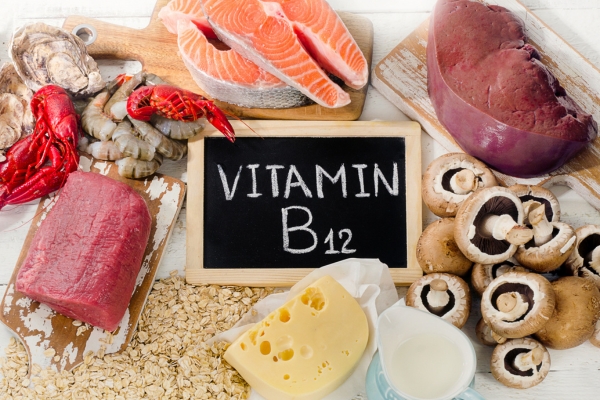
B12 (Cobalamin)
B12, or cobalamin, is critical for maintaining nerve health and brain function.
It is essential for the production of myelin, the fatty sheath that covers and protects nerves, and is necessary for the production of neurotransmitters.
B12 also plays a role in red blood cell formation and DNA synthesis.
A deficiency in B12 can lead to memory loss, confusion, and even dementia in severe cases.
Rich sources of B12 include meat, fish, dairy products, and fortified cereals.
The recommended daily intake is 2.4 mcg for adults. [8]

Benefits of B Vitamins for Older Adults
By supporting energy production, cognitive function, and mood regulation, B vitamins offer comprehensive benefits that help older adults maintain their vitality and mental health as they age.
Energy Boost
B vitamins are crucial for combating fatigue and enhancing overall energy levels, particularly in older adults.
They play a key role in converting the food we eat into usable energy.
Vitamins B1, B2, B3, B5, and B7 are directly involved in metabolic processes that produce ATP, the energy currency of cells.
By supporting these processes, B vitamins help maintain steady energy levels throughout the day, preventing the tiredness and lethargy that often accompany aging.
Cognitive Health
Maintaining cognitive health is another significant benefit of B vitamins for older adults.
Vitamins B6, B9, and B12 are essential for brain function and mental clarity.
They assist in the synthesis of neurotransmitters that regulate mood and cognitive processes.
These vitamins also help reduce homocysteine levels, which, when elevated, are associated with an increased risk of cognitive decline and dementia.
Regular intake of these B vitamins can help preserve memory, improve mental clarity, and reduce the risk of cognitive impairments.
Mood Regulation
B vitamins have a profound impact on mood and mental well-being.
They are involved in the production of serotonin, dopamine, and GABA, neurotransmitters that regulate mood, anxiety, and stress levels.
A deficiency in B vitamins, particularly B6, B9, and B12, can lead to mood disorders such as depression and anxiety.
Ensuring adequate intake of these vitamins can help stabilize mood, enhance emotional resilience, and promote overall mental well-being, making a significant difference in the quality of life for older adults.

How to Incorporate B Vitamins into Your Diet
By following these tips, you can ensure that your diet is rich in B vitamins, supporting your overall health and well-being.
Dietary Sources
Incorporating B vitamins into your diet can be achieved by consuming a variety of foods rich in these essential nutrients.
Here’s a comprehensive list of foods rich in B vitamins:
- B1 (Thiamine): Whole grains, pork, fish, legumes, and seeds.
- B2 (Riboflavin): Eggs, dairy products, green vegetables, meat, and almonds.
- B3 (Niacin): Meat, fish, poultry, whole grains, and peanuts.
- B5 (Pantothenic Acid): Chicken, beef, potatoes, oats, tomatoes, and broccoli.
- B6 (Pyridoxine): Poultry, fish, potatoes, chickpeas, bananas, and spinach.
- B7 (Biotin): Eggs, almonds, spinach, sweet potatoes, and broccoli.
- B9 (Folate): Leafy green vegetables, legumes, nuts, seeds, and fortified cereals.
- B12 (Cobalamin): Meat, fish, dairy products, and fortified cereals.
Supplements
Sometimes, it can be challenging to get enough B vitamins through diet alone, especially for older adults or those with dietary restrictions.
In such cases, supplementation can be beneficial. B-complex supplements are available that contain all eight B vitamins.
When considering supplementation, it’s important to follow the recommended dosage and consult with a healthcare provider to ensure safety and avoid potential interactions with medications.
Typically, a B-complex supplement can provide the necessary daily amounts, but individual needs may vary.
Balanced Diet Tips
Maintaining a balanced diet is key to ensuring adequate intake of B vitamins. Here are some practical tips:
Diverse Diet: Include a variety of foods in your diet to cover all B vitamins.
Whole Foods: Prioritize whole grains, lean proteins, fruits, vegetables, nuts, and seeds.
Fortified Foods: Consider incorporating fortified cereals and plant-based milks to boost B vitamin intake, especially for B12.
Regular Meals: Eat regular, well-balanced meals to provide a steady supply of B vitamins throughout the day.
Limit Processed Foods: Minimize consumption of processed foods, which often lack essential nutrients, including B vitamins.

Wrap-Up
B vitamins play an essential role in maintaining energy levels and supporting brain function, particularly in older adults.
Thiamine (B1), riboflavin (B2), niacin (B3), pantothenic acid (B5), and biotin (B7) are crucial for energy metabolism, helping to combat fatigue and enhance overall vitality.
Pyridoxine (B6), folate (B9), and cobalamin (B12) are vital for cognitive health, preventing cognitive decline, and supporting mental clarity.
Additionally, these vitamins contribute to mood regulation and overall mental well-being.
It’s time to take a closer look at your diet and ensure you are getting enough B vitamins.
Incorporate a variety of B vitamin-rich foods, such as whole grains, lean proteins, leafy greens, nuts, and dairy products, into your daily meals.
If dietary intake is insufficient, consider a B-complex supplement after consulting with a healthcare provider.
By making these adjustments, you can support your energy levels, brain health, and overall quality of life as you age.
Don’t wait—start integrating these vital nutrients into your diet today!
References
Informa Healthcare
Rivlin RS. Riboflavin. In: Coates PM, Betz JM, Blackman MR, et al., eds. Encyclopedia of Dietary Supplements. 2nd ed. London and New York: Informa Healthcare; 2010:691-9.
StatPearls
Penberthy WT, Kirkland JB. Niacin. In: Erdman JW, Macdonald IA, Zeisel SH, eds. Present Knowledge in Nutrition, 10th ed. Washington, DC: Wiley-Blackwell; 2012:293-306.
StatPearls
Sanvictores T, Chauhan S. Vitamin B5 (Pantothenic Acid) [Updated 2024 Feb 29]. In: StatPearls [Internet]. Treasure Island (FL): StatPearls Publishing; 2024 Jan-. Available from: https://www.ncbi.nlm.nih.gov/books/NBK563233/
Institute of Medicine, Food and Nutrition Board
Institute of Medicine. Food and Nutrition Board. Dietary Reference Intakes: Thiamin, Riboflavin, Niacin, Vitamin B6, Folate, Vitamin B12, Pantothenic Acid, Biotin, and Choline. Washington, DC: National Academy Press; 1998.
Institute of Medicine, Food and Nutrition Board
Institute of Medicine. Food and Nutrition Board. Dietary Reference Intakes: Thiamin, Riboflavin, Niacin, Vitamin B6, Folate, Vitamin B12, Pantothenic Acid, Biotin, and Cholineexternal link disclaimer. Washington, DC: National Academy Press; 1998.
StatPearls
Merrell BJ, McMurry JP. Folic Acid. [Updated 2023 Aug 8]. In: StatPearls [Internet]. Treasure Island (FL): StatPearls Publishing; 2024 Jan-. Available from: https://www.ncbi.nlm.nih.gov/books/NBK554487/
Institute of Medicine, Food and Nutrition Board
Institute of Medicine, Food and Nutrition Board. Dietary Reference Intakes for Thiamin, Riboflavin, Niacin, Vitamin B(6), Folate, Vitamin B(12), Pantothenic Acid, Biotin, and Choline. Washington, DC: National Academies Press; 1998.

